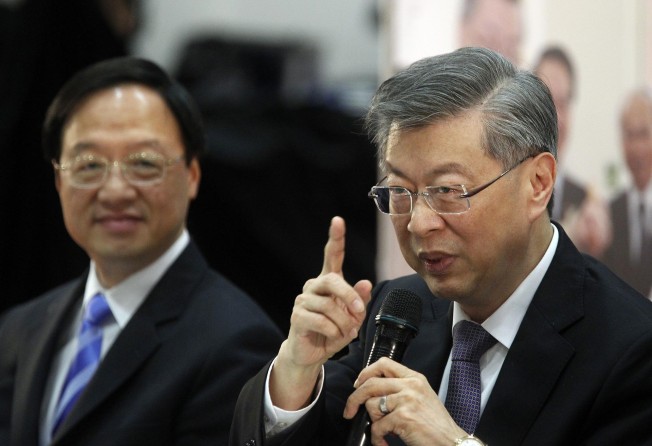Taiwan premier Sean Chen's resignation seen as a bonus for Ma
Finance veteran has taken the brunt of public anger over flailing economy and his departure may help president salvage his second term

Taiwanese Premier Sean Chen has resigned in a move analysts say should help salvage the sagging popularity of the island's leader, Ma Ying-jeou, amid lingering economic woes and growing public disillusion with his government.
It would also help prevent Ma, whose second four-year term ends in 2016, from becoming a lame duck too soon, they said.
Chen, a veteran finance official before becoming premier last February, said yesterday he had submitted his resignation to Ma and the president had approved it on Monday.
He said he was resigning for health reasons. "There are no conspiracy theories involved in my decision to tender my resignation," he said, referring to reports by some Taiwanese media that Ma had been unhappy with Chen's handling of the sagging economy.
Chen said a medical check had led he and his family to decide he had to "completely change my life and work style to reverse the situation".
Chen has come under fire from opposition lawmakers and the public for failing to tackle long-term economic woes.
In the past year, Ma's popularity rating has slipped to 13 per cent - even worse than the 18 per cent of his predecessor, Chen Shui-bian, who was jailed for corruption. Some analysts said Ma's low popularity was one of the reasons for Chen's resignation.
"The dual leadership system in Taiwan has made the premier take the brunt of whatever is bad for the government," said Professor Hsu Yung-ming, a political scientist at Soochow University. In Taiwan, the premier is appointed by the president, who is elected by the people.
Hsu said that with many people living miserable lives because of the poor economy, it was not surprising that Ma's approval rating was so low.
He said that replacing Sean Chen with Vice-Premier Jiang Yi-huah would help ease public dissatisfaction and could also help consolidate Ma's power.
Jiang, 53, is seen as one of Ma's most trusted confidants. He is expected to win legislative approval for his promotion soon.
With a PhD in political science from Yale University, Jiang is considered a relatively newcomer in Taiwanese politics. He worked as the island's research director before becoming interior minister and vice-premier.
"The appointment of Jiang can also keep Ma from becoming a lame duck too soon," said Professor George Tsai Wei, a political analyst at Chinese Cultural University in Taipei.
With more people questioning Ma's administrative performance, and with some heavyweights within his Kuomintang questioning whether he should continue to lead the party, Ma risked becoming a lame duck unless he could get a firmer grip on power, Hsu said.
Tsai also said Jiang's appointment could check prominent politicians like New Taipei Mayor Eric Chu and Vice-President Wu Den-yih from emerging too early in the race to become the KMT's standard bearer for the 2016 presidential election.
"No one from the KMT is now sure who Ma will favour for the 2016 race," Tsai said.